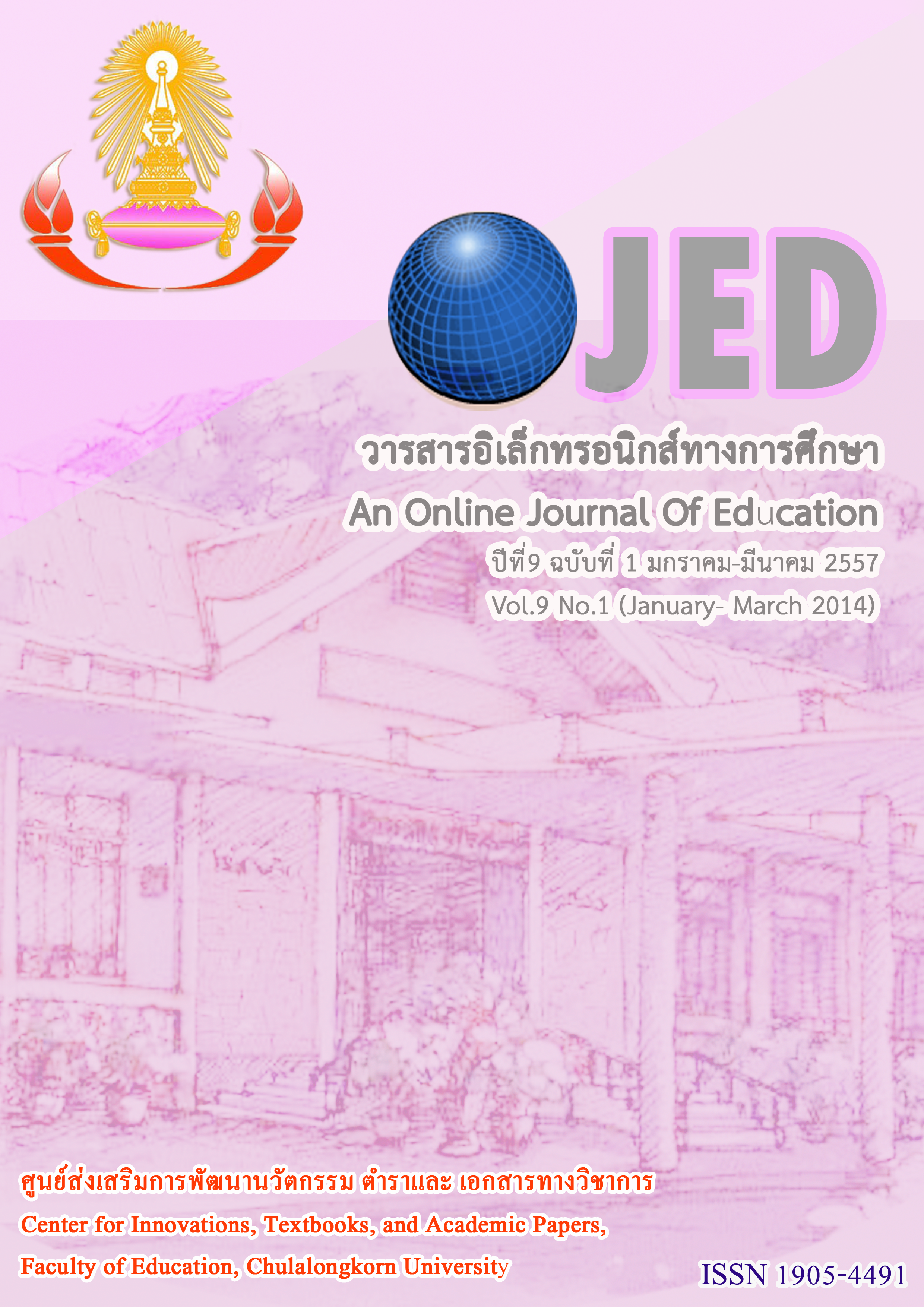บทบาทของผู้ปกครองในการส่งเสริมจริยธรรมแก่เด็กวัยอนุบาลในศูนย์เด็กบ้านรักแห่งสันติ PARENTS’ ROLES IN PROMOTING ETHICS OF PRESCHOOLERS IN BAN RAK HANG SANTI CHILD CARE CENTER
Keywords:
บทบาทของผู้ปกครอง, การส่งเสริมจริยธรรม, เด็กวัยอนุบาล, PARENTS’ ROLES, PROMOTHING ETHICS, PRESCHOOLERSAbstract
การวิจัยครั้งนี้มีวัตถุประสงค์เพื่อ ศึกษาบทบาทของผู้ปกครองในการส่งเสริมจริยธรรมแก่เด็กวัยอนุบาลใน 2 ด้าน คือ ด้านการสอนทางตรง และด้านการสอนทางอ้อม กลุ่มตัวอย่างที่ใช้ในการวิจัย คือ ผู้ปกครองของเด็กอนุบาล อายุ 3–5 ปี ในศูนย์เด็กบ้านรักแห่งสันติ (นามสมมติ) ที่กำลังศึกษาในภาคปลาย ปีการศึกษา 2556 จำนวน 129 คน เครื่องมือที่ใช้ในการวิจัย คือ แบบสอบถาม และแบบสัมภาษณ์ วิเคราะห์ข้อมูลโดยการแจกแจงความถี่ หาค่าร้อยละ ค่าเฉลี่ย ส่วนเบี่ยงเบนมาตรฐาน และการวิเคราะห์เนื้อหา
ผลการวิจัยพบว่า บทบาทของผู้ปกครองในการส่งเสริมจริยธรรมแก่เด็กวัยอนุบาล โดยรวมอยู่ในระดับปฏิบัติบ่อยครั้ง ( = 3.87) เมื่อพิจารณาเป็นรายด้านพบว่า 1) ด้านการสอนทางตรง ผู้ปกครองมีการปฏิบัติอยู่ในระดับบ่อยครั้ง ( = 3.97) โดยบทบาทที่ผู้ปกครองปฏิบัติบ่อยครั้ง ได้แก่ การให้คำชื่นชมลูกเมื่อลูกทำความดี และการสอนให้ลูกรู้ว่า “ใครทำกรรมใดไว้ย่อมได้รับผลของกรรมนั้น” 2) ด้านการสอนทางอ้อม ผู้ปกครองมีการปฏิบัติอยู่ในระดับบ่อยครั้ง ( = 3.78) โดยบทบาทที่ผู้ปกครองปฏิบัติบ่อยครั้ง ได้แก่ การใช้ชีวิตแบบพอเพียง ประหยัด ใช้ของอย่างมีประโยชน์ และคุ้มค่า การให้คำชื่นชมลูกเมื่อลูกทำความดี และการพาลูกออกไปใช้เวลาอยู่กับธรรมชาติที่งดงามภายนอกบ้าน
The purpose of this research was to study parents’ roles in promoting the ethics of preschoolers according to two aspects: direct instruction and indirect instruction. The research sample consisted of 129 parents of preschoolers aged 3-5 years old, studying in the second semester of academic year 2013 at Ban Rak Hang Santi Child Care Center (alias). The research tools comprised questionnaires and interview forms. The data were analyzed by using frequency, percentage, arithmetic mean, standard deviation, and content analysis.
The research found that parents’ role in promoting the ethics of preschoolers were performed at frequent level ( = 3.87). Regarding each aspect, it was found that: 1) in direct instruction, the parents performed at a frequent level ( = 3.97). The roles frequently performed by the parents included promoting children’s potential through giving compliments to children when they did good things and teaching them to learn that “He who acts shall receive the outcome of his action”; 2) in indirect instruction, the parents performed at frequent level ( = 3.78). The roles of frequently performed by parents included promoting children’s potential through living life in a sufficient way, being economical, using useful things, giving compliments to children when they did good things, taking children out to spend time outdoors with nature.




